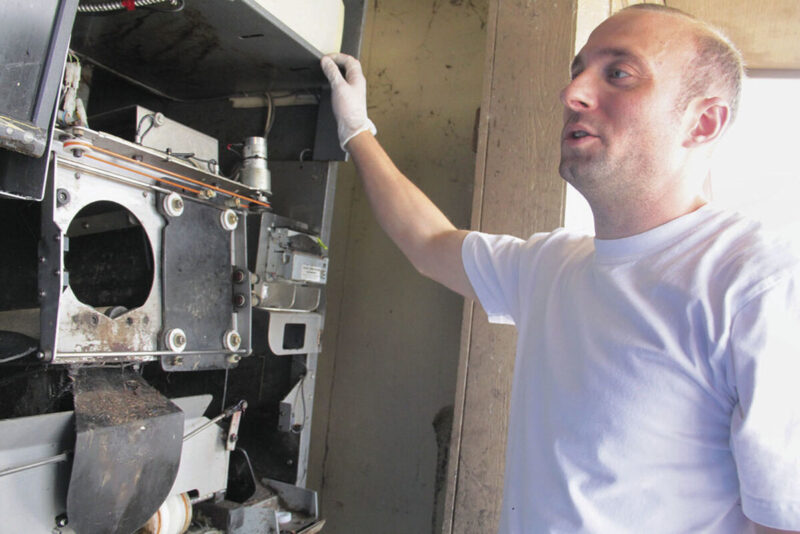Sean C. Morgan
While the governor released Phase II guidelines last week, Sweet Home businesses that have been closed are getting back to work while others that remained open are continuing to meet changing guidelines in response to closures mandated by the state to slow the spread of COVID-19.
“We’re opening,” said Dave Bauer, owner of Steelhead Strength and Fitness, in a video posted to Facebook. “Monday morning, 4 a.m. We want to be open 24 hours, but we’ll be open as many hours as we can squeeze out of it.”
To be open 24 hours, under re-opening guidelines, fitness centers must be staffed the entire time, Bauer told The New Era. “I can’t afford to have staff 24/7 (with fewer members coming back.)”
Bauer said he was able to get a federal PPP loan approved, but he won’t be able to use it. The period to pay it back is 18 months, and the payments are too high; and some of the stipulations for staffing were unworkable.
He was able to access an Economic Injury Disaster Loan through the U.S. Small Business Administration, with a longer repayment period and lower payments; and that will allow him to staff the gym on a limited basis.
“It’s been kind of a whole mess trying to get ready,” Bauer said. “We weren’t expecting to get into Phase I. Originally, it was maybe Phase II.”
At about that time, he decided to start a project, expanding the cardio area to allow for 6-foot physical distancing. Right after demolition, he learned that gyms would reopen under Phase I. Since then, he has been working on it, but his time has been limited by a second job he has at Lowe’s Distribution Center, a job that helped him pay his bills while the gym has been shut down.
At this point, the gym will be open from 4 a.m. to 9 p.m. Monday through Thursday, 5 p.m. to 6 p.m. on Friday and 7 a.m. to 1 p.m. on Saturday.
The gym will be open on a limited basis between 11 a.m. and 1 p.m. for high-risk members, those 60 or older and those with underlying medical conditions. It also will be closed between 1 and 3 p.m. for cleaning.
“It’s going to be good,” Bauer said. “It’s good to be able to reopen ahead of schedule. I really want to put my staff back to work, but it’s going to take numbers.
“I just want to thank Sweet Home for supporting us. They’re the reason we’re able to reopen.”
Elsewhere in Sweet Home, the Point Restaurant reopened its dining room under state guidelines, but others, like A&W have not yet.
It didn’t make sense to reopen the dining room under Phase I guidelines, said owner Josh Hankins. A&W would be able to open maybe six tables, and staff would be required to keep a close eye on customers.
“We have opened the outdoor seating,” Hankins said. A&W discouraged their use under the state’s mandated closure, but with Phase I, it re-opened the seating.
Hankins said he’ll look at Phase II guidelines to determine whether he will be able to open the dining room again.
Hankins applied for federal funding with early encouragement from the A&W corporation, he said. He had assistance from A&W and his bank and found the process “pretty straightforward.”
Overall, A&W has weathered the closure fairly well.
“The first couple of weeks of March were a little slower for sure,” Hankins said. “It seemed like April and May were pretty strong. It seemed comparable to what we’re used to doing.”
A&W staff were worried the car hop system wouldn’t work very well, he said, but it did. That system combined with deliveries have helped keep a steady stream of business.
Hankins said an online ordering system will be up and running in the next week or two.
Cedar Shack has kept a window open throughout the closure.
“We probably won’t reopen dining room totally but for small groups only,” said owner Jan Hufford. “It’s the cleaning involved between customers and rearranging tables and chairs to be compliant. Being to-go only reminds us of being in the old Cedar Shack and we like that. Customers have been wonderful and we really appreciate the support of the community.”
Hufford said Cedar Shack has not used any grants or loans.
The Point reopened with all but three tables, said owner Mike Hall. He was able to open the tables outside the restaurant. Inside, every other table is in use.
“We were the lucky ones,” he said.
The first week, he was worried and started trying to figure out what to do. The business offered takeout through a window.
“For us, our sales are up,” Hall said. “We did very well throughout the whole thing.”
Grocery stores continue to have visible holes on their shelves.
“A lot of stuff is just hit and miss,” said Chad McDonald, a manager at family-owned Thriftway. Some core items have improved. “Toilet paper has definitely gotten better.”
But with a lot of stock items, the store is receiving half or less of its orders, McDonald said. The big thing is “chasing the next law or regulation” related to COVID-19.
Every day brings brings something different, McDonald said. Friday, stores were required to begin taking back cans and bottles, which requires the store to ensure people are keeping their distance at the return machine.
Dentist Ivan Wolthuis went back to work on May 4 after closing for seven weeks.
Being off work, “it was an odd time,” he said. Normally, if he had two months off, he would travel and take a vacation, but that’s not something he could do during the shutdown. Instead, he worked around the family farm and took some continuing education.
He noted that his staff took a pay cut coming back to work with the additional benefits provided to those on unemployment assistance.
“My staff has been great,” Wolthuis said. “They knew the unemployment benefits were going to end.”
The staff all knew they needed to “come back as soon as we could,” Wolthuis said, because people need their teeth cleaned and teeth filled.
While dentists were already ahead of the curve with infection control measures, “we were all a little bit nervous the first day,” Wolthuis said, adding that those fears dissipated as things moved smoothly.
Patients are fully engaged and returning to the business, he said. The infection control measures mean it’s a little slower, but “we’re doing better than I expected.”
“I’m excited to be back to work. The patients need us. The employees needed their work.”
Many dentists applied for federal assistance, Wolthuis said, but he did not.
“There was a lot of uncertainty in the terms and rules of the grant programs,” he said, but now lobbyists are asking the government to change the rules, to create less confusing rules.
The Rio Theatre remains shut down, except for a curbside food service.
“The curbside thing is helping,” said owner Thomas Baham. “It’s paying the bills, the electric, and it’s close to paying the mortgage every month. We’re not making money. We’re not losing money. I’m not going anywhere.”
Baham said he is planning to reopen the Roxy Theater screen with a multi-day screening of the extended version of “The Lord of the Rings” trilogy. Afterward, he may screen “The Hobbit” movies the same way. He announced in a Facebook post over the weekend that the anticipated start date is June 13.
He is concerned about the precedent of shutting down businesses in the future, he said. If the government could do it now, it can do it again in the future.
Baham thanked the community for its support. The first couple of days, people didn’t ask for anything. They just gave.
“This community really does care,” he said. “They put their money where their mouth is.”
He credits Hall from The Point Restaurant for the idea of opening curbside food service. Baham was reluctant, but he finally decided to try it, and it helped substantially.
While closed, Baham has been cleaning up and making small improvements throughout the building, but he’s anxious to start showing movies again.
He thinks the studios may begin pushing out new movies in the second or third week of August.
He is hoping to open before that, Baham said. “I can’t afford not to.”
While he has received an SBA loan, he hasn’t used it yet. Baham said he is uncertain about whether it is a grant or loan, and he won’t touch it until he knows the terms.
He has a Paycheck Protection Plan loan in process, Baham said. If that is approved, he’ll bring back his employees, and they’ll “go crazy.”





